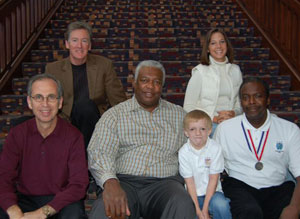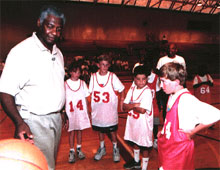
|
Oscar Robertson and the National Kidney Foundation
Since donating a kidney to his daughter Tia in 1997, Oscar Robertson has served as a national advocate for health and wellness, kidney disease prevention and organ transplantation on behalf of the National Kidney Foundation. He has also served as a spokesperson for the NKF's biennial Transplant Games. Since 2005, a portion of the proceeds from the U.S. Basketball Writers breakfast on the eve of the NCAA Final Four, at which the Oscar Robertson Trophy is presented, has been earmarked for the National Kidney Foundation. The breakfast also offers an opportunity for the local NKF affiliate in the Final Four host city to be recognized, and to enroll the local medical community in supporting the breakfast. 
When The Big O was in Kansas City as part of the first class to be inducted into the National Collegiate Basketball Hall of Fame, he also visited the National Kidney Foundation of Kansas and Western Missouri. From left, front row: Dr. Bradley Warady, Children's Mercy Hospital; liver recipient and Team MO-KAN member Tyler Harrald; and kidney transplant recipient and Team MO-KAN member Charles Anderson. Back row: Randy Williams, CEO, National Kidney Foundation of Kansas and Western Missouri; and Melissa Long, National Kidney Foundation, Team MO-KAN manager.
The MO-KAN affiliate has put in place a new program called KID POWER, an engaging and informative NKF program for tweens (ages 8-13), focusing on healthy eating and becoming more active. Created by local pediatricians and nutritionists, KID POWER seeks to prevent future health problems associated with being overweight or obese such as diabetes and high blood pressure - two of the leading causes of kidney disease. The 13-week curriculum, which focuses on fitness, food, fun, feelings and family is available to elementary and middle schools and community groups.
I Want Your Autograph — To Help Save Lives
by Oscar Robertson
During my long career in basketball, I was privileged to play with or against some of the greatest athletes of our time. But for sheer determination, no one can top the athletes who participate in the National Kidney Foundation's biennial U.S. Transplant Games. Since 1998, it has been my privilege to serve as an honorary spokesperson for these games. The Transplant Games, which began in 1990 with 400 participants, include kidney, liver, heart, pancreas, lung, and bone marrow transplant recipients. Every other summer, more than 2000 men, women, boys and girls compete in basketball, tennis, table tennis, cycling, track and field, swimming, bowling, badminton, golf, racquetball, volleyball and a 5K road race. They are cheered on by their families, the families of 1000 organ donors, and, in some cases, the donors themselves. The Transplant Games athletes are living proof that organ transplant recipients can enjoy active and productive lives. So is Sean Elliott of the San Antonio Spurs, who in 1999-2000 became the first professional athlete to return to competition after receiving an organ transplant. He was at the 2000 Transplant Games along with his brother and kidney donor Noel. Olympic champion sprinter Carl Lewis also joined us that year. NBA Entertainment and NBA Communications have consistently been generous with their assistance in helping us increase media coverage of the Games. In May of 1997, I was blessed with the opportunity to donate a kidney to my daughter Tia, who was suffering from kidney failure as a result of lupus. How's she doing? Not only did she make a full recovery, but it was one of the proudest moments of my life when I presented the gold medal for tennis mixed doubles to Tia and her partner Walt Hull at the 1998 Transplant Games. I hope the Transplant Games athletes will inspire many more organ donations. But I need your help as well, both in reducing the need for organ transplants, and making sure that anyone who does need an organ transplant can get one. First, let's advocate for and help fund the return of physical education to the standard K-12 curriculum, better park and recreation programs for Americans of all ages, and ongoing public education about the benefits of regular exercise and good nutrition and dietary habits. As we as a nation become more sedentary, exercise less and eat more poorly, obesity, diabetes and high blood pressure are reaching epidemic proportions in older adults and increasingly among youngsters as well. Obesity is a major cause of diabetes, heart trouble and kidney and urologic diseases, and puts a strain on other vital organs as well. While we celebrate the huge and lucrative growth of spectator sports, I also want to encourage spectators to become active participants in sports or some other form of regular exercise. Second, we need a huge increase in organ donations. Nearly 70,000 people a year are on the waiting list for organ transplants. They'll wait three months to three years, depending on the type of organ. Between 4,000 and 5,000 people a year will die before the organ they need becomes available. Many more never even make it to the waiting list. Without funds or health insurance, they're "green screened" by health care officials. Most of these deaths are preventable! Organ transplants now have more than a 60-year track record of success. Transplant procedures have been perfected. So there's no reason for most transplant candidates to die except that organs are not available. Since 1988, organ donations have remained relatively static at 5000 a year, a small percentage of the qualified people who could donate their organs upon death. Living donation is also an option in some cases. Kidney transplants are the most common, but bone marrow, portions of a lung, pancreas or liver can also be transplanted. Even though we have the capability to save many more lives, we're not doing it. Here's why: •Organ
procurement procedures and transplant criteria are inconsistent from
state to state. We now have a National Organ Donor Initiative, which requires uniform national criteria, a uniform organ registry data base, and that hospitals ask survivors for consent to organ donation, even if no donor card has been signed. Getting this Initiative fully implemented is another matter. Here's how we can help save lives in the meantime. Since the beginning of my career, I figure I must have signed more than half a million autographs. Now I want yours, America. Actually, I want four autographs. First, please sign and carry an organ donor card. Second, please give written instructions to your relatives to honor your wishes regarding donation, and not to withhold their consent. Third, please write your senator and congressperson and urge them to amend the law, so that survivor consent is no longer necessary when a person has already signed an organ donor card. Finally, until such time as the law is changed, please meet with an attorney and sign a document making an irrevocable gift of your organs, which is the best alternative for the moment because it does not require survivor consent. As we celebrate the courageous athletes at the Transplant Games, let's also do our part to help save even more lives. Thank you. Last Update: 2/4/09 For more information on the Transplant Games, or a free organ donor card, phone the National Kidney Foundation at (800) 622-9010, or visit www.kidney.org. Other good sources of information on organ transplantation issues are www.unos.org (United Network for Organ Sharing) and www.hhs.gov (the Department of Health and Human Services). This
article first appeared in Sports Business Journal and is reprinted
by permission. |
© 2017 Oscar Robertson Media Ventures
Site Design & Content: Michael O'Daniel







